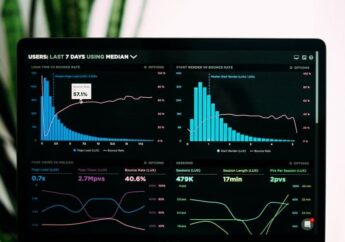High-Frequency Transactions and Quantum AI: A Collaborative Approach?
by Mony Shah Information Technology Published on: 31 August 2023 Last Updated on: 05 October 2023

In the world of finance, where speed and accuracy are of utmost importance, high-frequency transactions have become a vital component of modern trading strategies. These transactions involve the rapid buying and selling of financial instruments, often taking place within fractions of a second. With the rise of quantum computing and artificial intelligence (AI), there is increasing interest in exploring the intersection of high-frequency transactions and quantum AI. This collaborative approach has the potential to revolutionize the finance industry, bringing together the power of advanced computing technologies to unlock new possibilities.
Understanding High-Frequency Transactions
High-frequency transactions, also known as high-frequency trading (HFT), have gained prominence in recent years due to advancements in technology and increased market volatility. In essence, these transactions rely on complex algorithms and high-speed data processing systems to execute trades at lightning-fast speeds. This allows traders to take advantage of minuscule price differences in the market, profiting from even the smallest fluctuations.
High-frequency transactions have revolutionized the way financial markets operate. With the ability to execute trades in microseconds, HFT has transformed the landscape of trading, making it more efficient and dynamic. Traders can now capitalize on market opportunities that were once impossible to exploit.
The Role Of High-Frequency Transactions In Modern Finance
High-frequency transactions play a crucial role in today’s financial landscape. They provide liquidity to the markets, ensuring that buyers and sellers can swiftly execute their trades. This liquidity is essential for maintaining market efficiency and stability. Without high-frequency transactions, markets would be less liquid, making it harder for investors to buy and sell securities.
Additionally, HFT can help to narrow bid-ask spreads, reducing the costs associated with trading for market participants. By constantly monitoring market conditions and executing trades at lightning-fast speeds, high-frequency traders contribute to tighter spreads, benefiting both institutional and retail investors.
However, the increasing prevalence of high-frequency transactions has also raised concerns regarding market stability and fairness. Critics argue that HFT can amplify market volatility, leading to abrupt price swings and potential market disruptions. Furthermore, there are concerns about the fairness of HFT, as high-speed traders may have an advantage over traditional investors due to their access to advanced technology and data.
Challenges In Managing High-Frequency Transactions
Despite the numerous benefits offered by high-frequency transactions, there are several challenges involved in managing them effectively. One major challenge is the need for sophisticated technology infrastructure capable of handling vast amounts of data and executing trades with minimal latency.
High-frequency traders rely on powerful computer systems and advanced algorithms to process massive amounts of market data in real-time. These systems need to be constantly monitored and upgraded to ensure optimal performance. Additionally, the infrastructure must be designed to withstand high volumes of trading activity without experiencing delays or system failures.
Furthermore, regulatory compliance and risk management are crucial aspects that must be carefully considered to ensure the stability and integrity of the financial markets. Regulators need to establish rules and regulations that govern high-frequency trading activities, ensuring fair and transparent markets. Risk management practices should be implemented to mitigate the potential risks associated with HFT, such as erroneous trades or market manipulation.
In conclusion, high-frequency transactions have become an integral part of modern finance, providing liquidity and efficiency to the markets. However, their increasing prevalence raises concerns about market stability and fairness. Effective management of high-frequency transactions requires sophisticated technology infrastructure and robust regulatory oversight. As technology continues to advance, the impact of high-frequency trading on financial markets will continue to evolve.
An Introduction To Quantum AI

QuantumAItradingapp.org, a combination of quantum computing and artificial intelligence, is an emerging field that holds tremendous promise for various industries, including finance. Quantum computing leverages the principles of quantum mechanics to perform calculations exponentially faster than classical computers. This increased computational power opens up new possibilities for solving complex problems and optimizing processes.
The Basics Of Quantum Computing
Quantum computing operates on the principles of superposition and entanglement, allowing quantum bits, or qubits, to exist in multiple states simultaneously. This unique property enables quantum computers to perform complex calculations in parallel, vastly speeding up computation time. Quantum algorithms, such as Shor’s algorithm for integer factorization and Grover’s algorithm for searching an unsorted database, have the potential to revolutionize cryptography and optimization.
How AI Is Being Transformed By Quantum Computing
By combining AI with quantum computing, researchers are exploring new frontiers in machine learning and optimization. Quantum AI has the potential to significantly enhance AI algorithms, enabling faster training and more advanced data analysis. This could lead to breakthroughs in areas such as natural language processing, computer vision, and financial modeling.
The Intersection Of High-Frequency Transactions And Quantum AI
The intersection of high-frequency transactions and quantum AI holds immense potential for reshaping the finance industry. Quantum computing can provide a substantial boost to the speed and efficiency of high-frequency trading algorithms, enabling traders to make faster and more informed decisions. Additionally, the integration of AI techniques into high-frequency transactions can enhance prediction models and risk management strategies.
Potential Benefits Of Quantum AI In High-Frequency Transactions
One of the key advantages of incorporating quantum AI into high-frequency transactions is the ability to process vast amounts of data and perform complex calculations in real-time. This can lead to improved trading strategies, better risk management, and enhanced market efficiency. Moreover, quantum AI can enable traders to detect hidden patterns and correlations in market data, providing them with a competitive edge.
Case Studies Of Quantum AI In High-Frequency Transactions
Several case studies have demonstrated the potential of quantum AI in high-frequency trading. For instance, researchers have developed quantum algorithms that can optimize trade order routing, minimizing transaction costs and maximizing execution speed. Additionally, quantum AI has shown promise in analyzing market data to identify anomalies and predict market movements with greater accuracy.
The Collaborative Approach: Merging High-Frequency Transactions And Quantum AI
The collaborative approach involving the merger of high-frequency transactions and quantum AI holds the promise of transforming the finance industry. Collaboration among experts from different disciplines, including finance, computer science, and quantum physics, is crucial in harnessing the full potential of these technologies.
The Role Of Collaboration In Technological Advancement
Collaboration is essential in driving technological advancements. By bringing together diverse expertise, collaborations can tackle complex problems from multiple angles, leading to more comprehensive solutions. In the context of high-frequency transactions and quantum AI, collaboration can help bridge the gap between theoretical research and practical implementation, ensuring that the advancements are scalable and aligned with industry needs.
How Collaboration Could Shape The Future Of Finance And AI
Collaboration between finance professionals and quantum AI experts has the potential to reshape the future of finance and AI. This collaboration can lead to the development of robust and scalable solutions that address the challenges associated with high-frequency transactions and leverage the power of quantum AI. By combining their respective expertise, these collaborations can drive innovation, improve market efficiency, and enhance risk management practices.
Potential Challenges And Solutions
While the collaborative approach of merging high-frequency transactions and quantum AI holds great promise, there are several anticipated challenges that need to be addressed. These challenges include the scalability of quantum computers, the need for quantum-safe encryption algorithms, and the ethical considerations surrounding the use of AI in finance.
Anticipated Obstacles In Implementing Quantum AI In High-Frequency Transactions
One major obstacle is the scalability of quantum computers. Currently, quantum computers have a limited number of qubits and face challenges in maintaining stability and minimizing errors. However, ongoing research and technological advancements are expected to overcome these limitations in the future.
Proposed Solutions To Overcome These Challenges
To overcome scalability challenges, researchers are exploring different approaches, such as error correction techniques and hybrid quantum/classical algorithms. Additionally, efforts are being made to develop quantum-safe encryption algorithms to ensure the security and integrity of high-frequency transactions. Finally, ethical frameworks and regulations need to be established to govern the use of AI in finance, addressing concerns related to bias, transparency, and accountability.
In conclusion, the collaborative approach of merging high-frequency transactions and quantum AI presents exciting possibilities for the finance industry. By combining the speed and efficiency of high-frequency transactions with the computational power of quantum AI, finance professionals can make more informed decisions, improve trading strategies, and enhance risk management practices. However, it is crucial to address the anticipated challenges and foster collaboration among experts to ensure that these advancements are ethically and responsibly implemented. The future of finance and AI is undoubtedly intertwined, and the collaborative approach could play a pivotal role in shaping this future.
Read Also







































































































